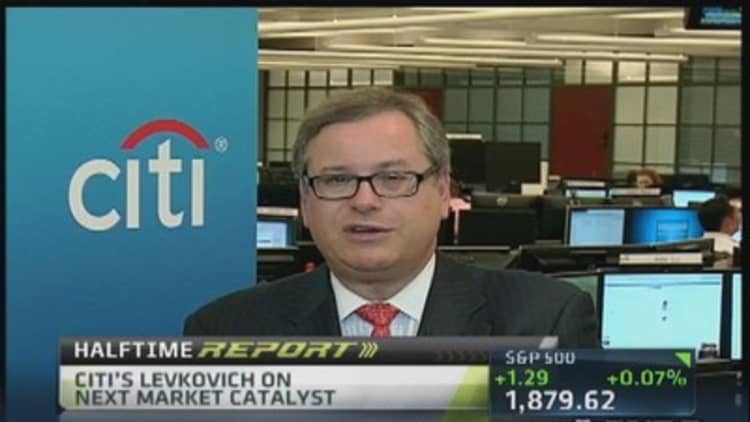So far this year, real estate investment trust (REIT) stocks have bucked the trend in the equity markets stall out. The MSCI US REIT Index has returned 12.18 percent, while the S&P 500 has sputtered to a 2 percent gain.
Experts say that some REIT sectors, such as industrial and lodging, will notch even better gains this year, as consumer confidence grows and real estate values rise. REITs also usually stand out when other stocks are languishing.
"There's room for more growth in REITs, since real estate will be stellar," said Bruce Garrison, a managing director at Chilton Capital Management in Houston. "Construction levels are still relatively depressed."
1. Watching video on your iPhone results in a REIT play
One of the best ways to target REIT returns is through a big technology trend: growth in data-center square footage. Gartner estimates that as data use rises, global data-center services demand will rise 7 percent annually until 2017.
One of the largest data center REITs is Digital Realty Trust, which runs data centers around the world and has a 6.2 percent dividend.
Garrison pointed to Carrollton, Texas-based CyrusOne (CONE), which operates 25 data centers around the world and yields 4.2 percent. It had a strong stock gain of 17 percent last year but has lost some ground this year. "But so far it's doing everything right," Garrison said. "In Texas, demand is excellent."
Read MoreBillions are pouring into these blockbuster funds
Wireless tower REITs—like American Tower—are another tech-derivative bet. "They benefit from mobile phone use and data needs," Garrison said.
2. A record vacancy decline supports industrials
U.S. industrial REITs are another sweet spot. They will be one of the top-performing sectors this year, said David Rodgers, a senior real estate research analyst at Robert W. Baird. "Last year was the largest single vacancy decline for U.S. industrial properties, benefiting REITs," Rodgers said. "So it's an appropriate place to be." At a market capitalization of $20.35 billion, Prologis is the world's largest industrial REIT. It operates 3,000 industrial properties in 21 countries. The global industrial REIT is also developing $3 billion of new assets, primarily warehouses.
In the U.S., Rodgers likes U.S.-centric First Industrial Realty Trust and Duke Realty. First Industrial has smaller-sized urban industrial warehouse spaces. Duke Realty has an active pipeline and diversified properties outside industrial, such as medical and office buildings. Both also sport healthy dividend increases and strong balance sheets. With REITs, it's better to favor companies with strong balance sheets and lower levels of debt, Rodgers said.
Read MoreChoosing between bonds and bond funds
3. You may have missed this one: Self-storage
Self-storage, an offshoot of industrial REITs, has been on a good run for several years, said Wilson Magee, director of global real estate at Franklin Templeton. And since storage REITs don't have long leases, they can capture economic upticks. It's starting to get more notice. Public Storage, which yields 3.3 percent and is up 16 percent so far this year, is high quality and has a strong balance sheet, Magee said. Extra Space Storage yields 3.2 percent and is up 20 percent. "It's pretty well managed and has very good revenue and earnings growth," he explained.
Health-care [REITs] have been hard-hit by fears of rising interest rates. These fears are misplaced.Todd LukasikMorningstar REIT analyst

4. Order room service: Hotel supply and demand is favorable
Magee also likes lodging REITs, where room rates are expected to keep rising as the recovery rolls on. One favorite is Host Hotels & Resorts, which operates upscale hotel properties in the United States and elsewhere. They have a variety of brands, such as Starwood, Sheraton and Westin. A smaller lodging REIT, called Pebblebrook Hotel Trust, was founded in 2009 and invests in hotels. "This is a growth story within lodging," Magee said, adding, "Pebblebrook is building up its portfolio."
Hersha Hospitality Trust, which yields 4.1 percent, caught Garrison's eye. Hersha owns and operates upscale and limited-services hotels, such as Doubletree. "Hotel supply is still very limited, which sets the stage for improved earnings and better profits," he said.
Read MoreA new reason to invest with active fund managers
5. Health care isn't overpriced in REIT context—it's actually undervalued
Morningstar believes that there is a value stock play within health-care REITs, including two that are in the S&P 500—HCP, which yields 5.4 percent, and Ventas, which yields 5.4 percent.
"Health-care stocks have been hard-hit by fears of rising interest rates," said Todd Lukasik, Morningstar REIT analyst, but he added, "These fears are misplaced." The reason: health-care REITs have long-term leases that include rent escalators, which will keep up with inflation.
"So REIT cash flow should continue to grow," Lukasik said. "Also, tens of millions more people who are joining the ranks of the insured should drive demand."



